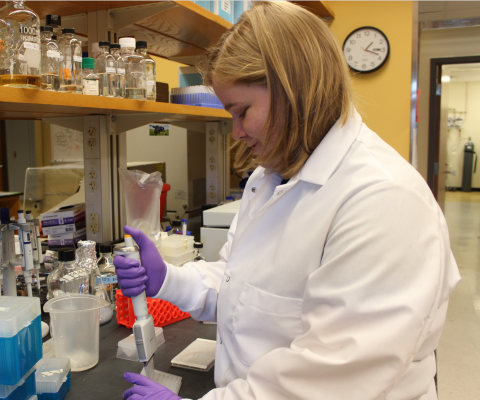Kari Mattison is a PhD candidate in Genetics and Molecular Biology at Emory University in Atlanta, Georgia, where her research involves the discovery of new genes that contribute to or cause epilepsy. After receiving her degree, Kari plans to continue her research, as well as participate in educating the next generation of scientists. Today she works with teachers in K-12 classrooms throughout Georgia to deliver science resources and promote careers in STEM.
In this interview, Kari shares the factors that sparked her passion for a career in science and the experiences that spurred her interest in epilepsy-related research.
Who or what inspired you to become a scientist?
I grew up in a household where science was the norm. Both of my parents have degrees in science, and I think their interests ultimately influenced my gravitating toward STEM.
What I remember most vividly is a summer program I participated in after fifth grade. It’s called “College for Kids and Teens.” The program is offered through the University of Wisconsin, Milwaukee, and I spent a week in a genetics lab that summer. I remember thinking that working in genetics is what I want to do for the rest of my life! I also had some incredible science teachers who helped fuel my passion to make science my career.
How do you envision your research contributing to the advancement of innovation in the nation?
My research involves discovering new genes that contribute to or cause epilepsy. By identifying new genes in epilepsy, we can work toward figuring out the answers to two questions:
How does disrupting a specific gene’s function lead to epilepsy?
What is the best treatment for people with a specific form of genetic epilepsy?
Epilepsy has a large public health impact in the United States, affecting more than 3 million children and adults. The goal is to find ways to stop the current problems these people are having, such as frequent seizures and developmental delays, and improve their conditions. Epilepsy researchers are pushing the boundaries of what’s already known and employing innovative techniques in solutions.
What are you eager to investigate further in your scientific research?
I recently discovered a new epilepsy gene. At this time, no other researcher knows how it causes epilepsy. I’m excited to take my research beyond this initial stage of discovery and into the details of how this gene functions.
I’m currently doing functional work to analyze how this gene impacts known signaling pathways involved in epilepsy. I’m also using computational modeling that will help identify the best type of treatment for individuals with a specific form of epilepsy.
What advice would you give to young people, especially young women and girls, to encourage an interest in science?
Exposure to the sciences is key in spurring young people’s interest in STEM. I work with the Rural Teacher Training Initiative through the Georgia BioEd Institute, which educates rural K-12 teachers in Georgia on low-cost ways to bring exciting hands-on science into the classroom. Teachers who participate in this program educate students on the basic skills they will need to pursue higher education in the sciences.
Too often I see young people shy away from what they’re passionate about. I’d say to them: if you have an interest in something, and are passionate about it, then use that passion to pursue your interest.
How has your ARCS Award helped you during your graduate years?
My ARCS Scholar Award has given me financial flexibility so I can attend scientific conferences that help sharpen my research. I attended the American Epilepsy Society Annual Meeting and received valuable feedback on how to best move my research forward. Without help from ARCS, I wouldn’t have had this experience or the professional feedback to take my research in epilepsy to the next level.

